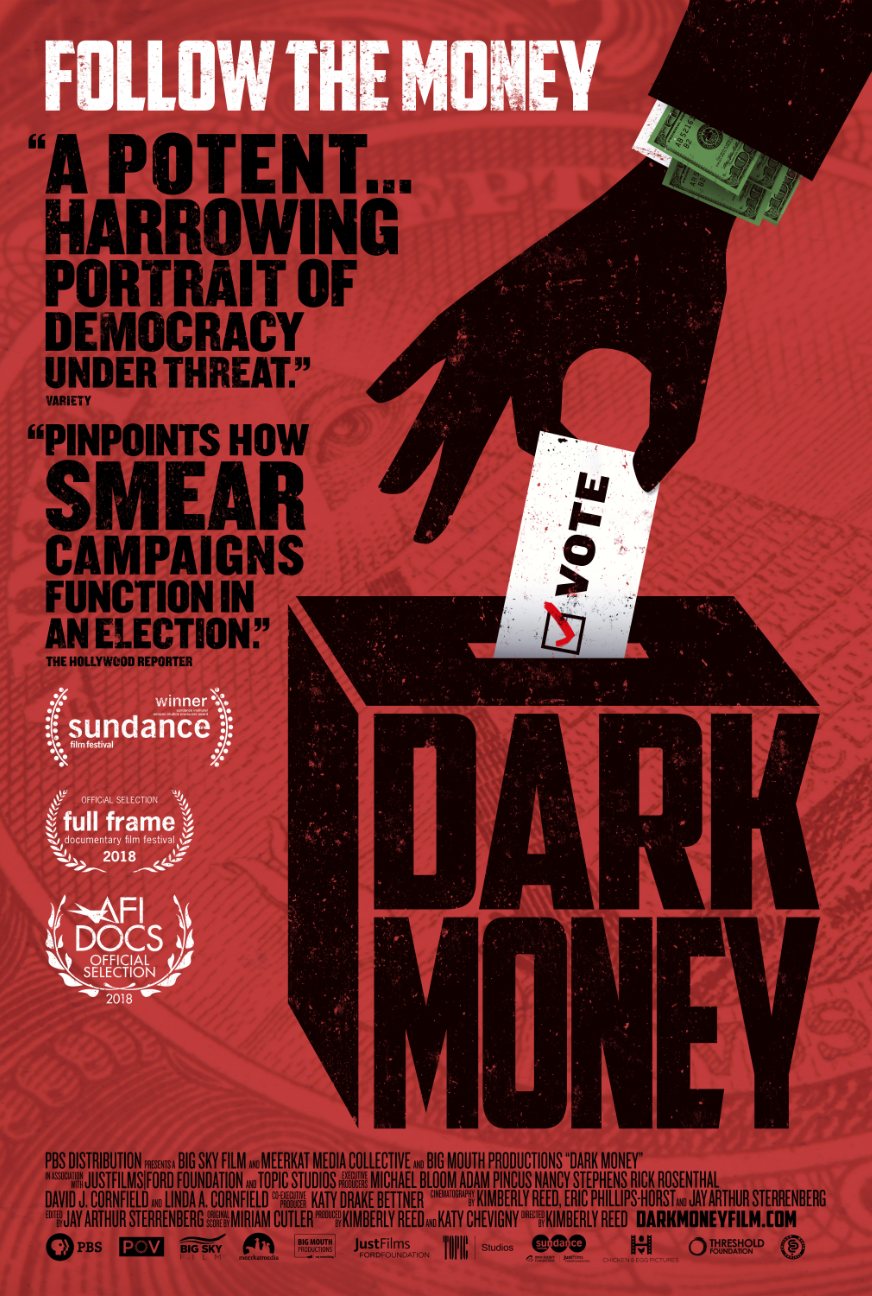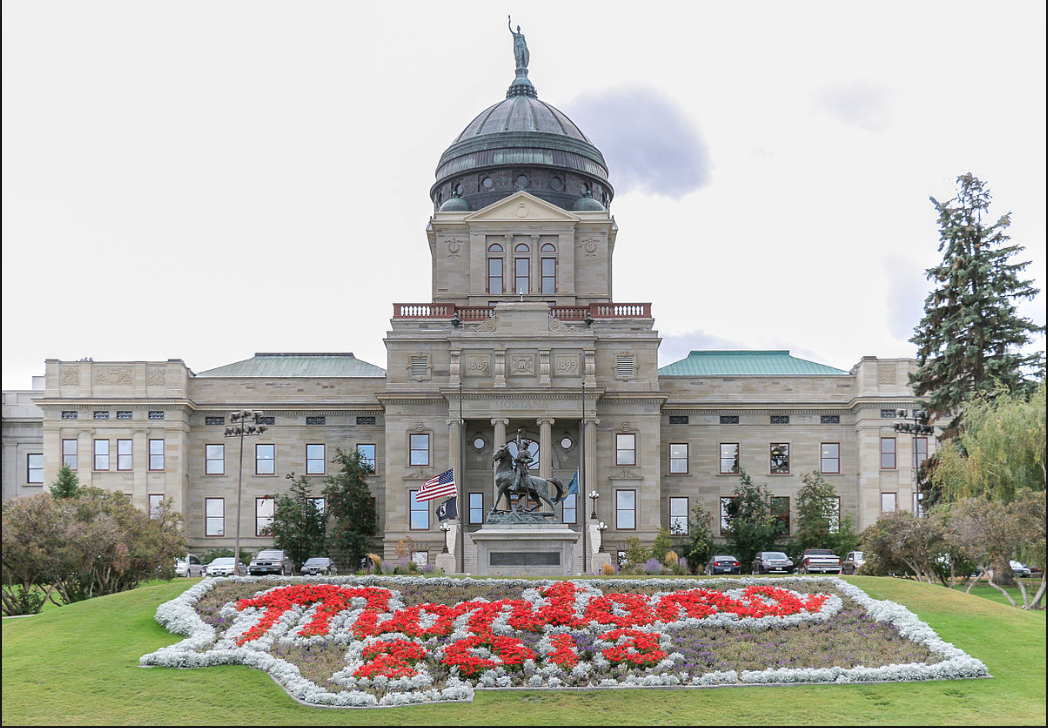|
Director Kimberly Reed provides reality check, but some hope, for America post-Citizens United: 'This is really about disclosure, about where this money is coming from' There is plenty to love about Montana. Wide open spaces, mountain scenery and abundant wildlife, lakes and rivers. But for filmmaker and Montana native Kimberly Reed, director of the new documentary Dark Money, there's another thing to love about her home state -- its political culture. Going back more than a hundred years, Montana's residents and citizen legislators have demonstrated an admirable independent streak, and a skepticism of monied interests that would try to control the state and its natural resources. "I'm super proud. I'm very proud of Montana," Reed told Nonfictionfilm.com. "We're talking about everyday folks trying to find very practical solutions to put democracy with a small 'd' back in the hands of people." Dark money is the advertising where you don't know who's paying for the ads. Reed's film shows just how difficult it has become for Montana and the country as a whole to maintain representative government in the face of massive spending by corporations and wealthy individuals intent on controlling the political system. These forces have pumped heaps of "dark money" into campaigns coast to coast, in races from state houses to the White House. The dollars have multiplied exponentially since 2010 when a divided U.S. Supreme Court ruled in the Citizens United case that corporations, like people, enjoy freedom of speech and thus can spend however much they want to express their opinions. Dark Money is now playing in San Francisco, Seattle, Washington D.C., Denver and many other cities and expands to more locations in the coming days and weeks (details here). Among Reed's characters is investigative reporter John S. Adams, who uses a whiteboard to sketch some of the preferred tactics of dark money outfits: "Corporation funnels money to a dark money group. They send out postcards attacking the opponent. When [their preferred] candidate gets elected they support the agenda of the corporation." Simple enough. But dark money groups are shadowy in the extreme and difficult if not impossible to track, as is the source of their funding. They often cloak themselves in sturdy-sounding names; one of them -- Western Tradition Partnership, a conservative 501(c)4 advocacy group now known as American Tradition Partnership -- sent mailings to Montana voters in recent years blasting various candidates as terribly dangerous. Surprisingly, a number of the people they went after were card-carrying members of the GOP. "These were very conservative, rock-ribbed, unflinching Republicans. [But] they also believe in government that works," Reed explained. "That's the line that they weren't towing because they were trying to find solutions to make government work better -- government along conservative principles -- but to make sure that the people in their communities had access to health care and had drinking water that was safe to drink... That's what put a target on their backs." Reed interviewed a number of political candidates in Montana who found they did not have the resources to counter deep-pocketed dark money organizations. "They send out all these mailings. They don't care if they lie," Debra Bonogofsky, a Republican candidate for Montana's legislature, complains bitterly in Dark Money. Jim Peterson, the Republican president of the Montana Senate, told the director that dark money threatens the very foundation of our democracy. In the film he says, "It won't be [government] 'by the people, for the people.' It will be something else." Despite the stakes involved, dark money maneuverings have largely gone unchallenged in many parts of the country. But Montana has proven the exception. Reed attributes that to several factors, citing efforts in the state a century ago to curb the power and influence of mining companies. Montana also has a tradition of parti-time citizen legislators, and a level of bipartisanship unusual in today's polarized landscape. "One of the things we chronicle in the film is this group of Republicans working with a Democratic governor in a state that Trump took by 20 points to create some of the strongest campaign finance laws in the country," Reed commented. "And that's a really hopeful story, that you can have reform in this really absolutely crucial system at the heart of our democracy, that we can reform that in of all places, Montana." Just last week the IRS and the Treasury Department announced measures that would allow some non-profits to conceal their donors and hide dark money campaign spending. U.S. Senator Jon Tester of Montana and Gov. Steve Bullock, both Democrats, are leading efforts to overturn that decision. That is not the only effort Montanans are making to throw light on dark money, Reed says. "Gov. Bullock signed an executive order that any contractors doing business with the state would have to disclose who they're giving political contributions to, which is a novel {approach]. Nobody else has done it," Reed observed. "It's the other way to get at the problem of where is this money coming from." Reed says transparency is critical and that nothing in the Supreme Court's Citizens United ruling endorses secrecy. "What we need to focus on right now is disclosure, is following that money," she stated. "And if you can do that, that more than anything else has the ability to eradicate dark money." Reed walks a fine line, both in the film and in conversation, about where the fault lies for the abuses of secretive campaign financing. "Democrats and Republicans both benefit from dark money, in federal, state, municipal races... But I don't want to create a false equivalency here," she affirmed. "Because no matter what level you look at the vast majority of that dark money is spent by Republicans. If you look at the federal level, dark money has been weaponized in a way that is very clearly skewed towards one political party. And equally importantly the intent to destroy enforcement with the IRS, with the SEC, with the FEC... is very clearly tied to one political party and that's the Republican Party." But Reed added, "I also want to emphasize, especially in places where it's relatively blue, that it's important for people on the left not just to point at Republicans and make sure that they're the evil ones and they're the bad ones and kind of rest on the laurels of the left as the ones who aren't engaging in this sort of spending. And it's important for people on the left to vote on the issue, demand from their elected officials reform on this issue and make sure that they hold their promises." Some viewers may experience Dark Money as a horror movie, depicting the ruin of American democracy. Others may see it as a political thriller, or as a drama with villains (politicians in the thrall of dark money) and heroes (politicians, reporters and watchdogs trying to fix the system).
To the director, Dark Money qualifies as an inspirational film. "I hope that people in other states can learn from the example of what happened [in Montana]," Reed said, "and see how crucial it is for voters to pay attention and to educate themselves and to have just a modicum of media literacy... so voters can be skeptical of that ad that they see on television, or the flyer that arrives in their mailbox." Dark Money, also, is a cautionary tale. Murky political spending has increasingly migrated to the web and social media, making it even more difficult to track. Of equal alarm are reports that have begun to clarify how much money may be flowing into our elections from foreign sources. "We just recently learned about a very key person in the Mueller investigation that was a direct conduit between the Trump campaign and the NRA and money coming from Russian oligarchs potentially, maybe," Reed said. "We shouldn't be sitting here wondering who was the largest contributor to the Trump campaign in 2016. We should have a system of elections that allows us to avoid the appearance of corruption and we don't." |
AuthorMatthew Carey is a documentary filmmaker and journalist. His work has appeared on Deadline.com, CNN, CNN.com, TheWrap.com, NBCNews.com and in Documentary magazine. |
- Home
- News
- Videos
-
Galleries
- 2019 Tribeca Film Festival
- Full Frame Documentary Film Festival
- 2019 SXSW Film Festival
- SXSW 2018 Gallery
- 2019 Sundance Film Festival
- Outfest 2018 Photo Gallery
- Outfest 2017
- Sundance 2018 Photos
- 2017 LA Film Festival
- 2017 Cannes Film Festival
- Tribeca Film Festival 2017
- SXSW 2017 Gallery
- 2017 Berlin Film Festival
- Sundance 2017 Gallery
- 2016 Los Angeles Film Festival
- Cannes Film Festival 2016
- SXSW 2016 Gallery
- Berlinale 2016 Gallery
- Sundance 2016 Gallery
- Filmmaker Gallery
- About
- Contact
Proudly powered by Weebly
- Home
- News
- Videos
-
Galleries
- 2019 Tribeca Film Festival
- Full Frame Documentary Film Festival
- 2019 SXSW Film Festival
- SXSW 2018 Gallery
- 2019 Sundance Film Festival
- Outfest 2018 Photo Gallery
- Outfest 2017
- Sundance 2018 Photos
- 2017 LA Film Festival
- 2017 Cannes Film Festival
- Tribeca Film Festival 2017
- SXSW 2017 Gallery
- 2017 Berlin Film Festival
- Sundance 2017 Gallery
- 2016 Los Angeles Film Festival
- Cannes Film Festival 2016
- SXSW 2016 Gallery
- Berlinale 2016 Gallery
- Sundance 2016 Gallery
- Filmmaker Gallery
- About
- Contact




 RSS Feed
RSS Feed